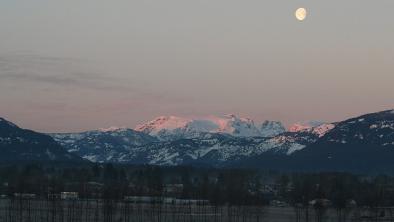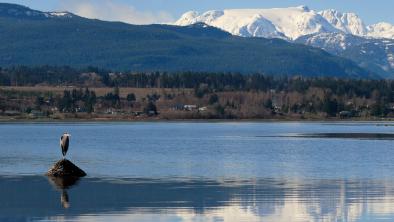The head of Compliance Energy Corp. said his firm's proposed Raven Underground Coal Project, in Vancouver Island's Comox Valley, will not harm the environment -- as critics protested outside the firm's annual general meeting today in Vancouver.
John Tapics, president and chief executive officer of Compliance Energy Corp., told The Tyee that he's listened to critics' environmental concerns as the company heads into its legally required environmental assessment process.
"We've listened to the issues and concerns raised by the local public," he said. "We've been very open and transparent with the public from day one as we began exploration of the project.
"We have committed to develop this project in an environmental and socially responsible manner."
Opposition to the Raven mine has focussed on the impact of mine tailings on the area's rivers, as well as the abundant Fanny Bay oyster bed in the sea nearest the site. Environmental groups have also expressed opposition to the coal industry, citing the fossil fuels' impact on climate change.
"I live in Fanny Bay, which is ground zero for this mine," said Comox Valley resident Lynne Wheeler. "This mine would be right in the heart of our watershed.
"It's very personally impacting me. I live just a few miles away from where the mine would be. . . I'm worried about global warming. I'm worried about my drinking water. I'm worried about the sustainable food industry being poisoned by the mine tailings. And I'm worried about my grandson -- what kind of world is that kid going to live in?"
But Tapics said that critics of his industry should consider what coal is being used for: in the case of the Raven project, coke, a vital part of producing steel.
"The coal we are extracting is coking coal," Tapics said. "There is no other means of making steel without some form of carbon. The whole steel industry is dependent on coking carbon. At this point in time, without the demand for steel, there wouldn't be a demand for coking coal."
The organizers of today's demonstration outside Compliance Energy's AGM said that the Raven Underground Coal Project is unsuitable for the Comox Valley, and an alternative to coal is needed to mitigate climate change.
"We need to be looking for alternatives here," said Torrance Coste, the Western Canada Wilderness Committee's Vancouver Island campaigner. "It's all dirty coal. The slag heaps from the processing are potentially going to pose a huge, huge risk to the Fanny Bay oyster beds, which is a really sustainable industry. This region wants fisheries, tourism and these kinds of economies that are going to last -- that aren't going to go away in 16 years."
On June 7, the company announced that Canada and the province had set out a framework for research required in order for the Raven project to be approved. Dubbed Application Information Requirements and Environmental Impact Statement Guidelines, the research requirements will likely result in 8,000 to 10,000 pages of expert documents, Tapics said. The company has already completed several months of public input into the project in the local community.
But environmentalists questioned the neutrality of the environmental assessment process in the wake of Bill C-38, the omnibus budget implementation bill, which cut the length of assessments and streamlined the process.
"Those assessments were imperfect before this administration's recent legislation," Coste said. "But after this, it's useless really.
"[Environmental assessments] now have absolutely no ramifications for any semblance of real safety or security for the environment."
Over the projected 16 year life of the Raven mine, Tapics said, it will employ 350 full-time workers and spend $1 billion in the local economy.
Photo: WC campaigner Torrance Coste speaks at the rally in Vancouver. Image by Joe Foy.


